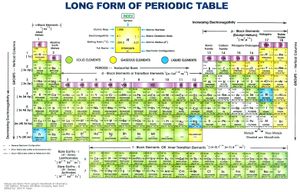Periodic table of elements
Summary
An element is a fundamental classification of atomic matter where differentiation of particles is made based on the number of protons found in their nucleus. So far 118 elements are known to exist either by producing them artificially or finding them naturally in the environment. Elements are sorted on the Periodic Table of the Elements in ascending order and are usually also provide the state of matter they exist in at STP.
A link to the table is given here
Elements by Group (vertical)
Elements in one group behave in a similar way and show the same overall general properties. The number of electrons in the outer shells of the electron orbitals is the same in every group, only the quantum number describing the orbitals increase. For instance the right column is that of the noble gasses. Because they have an outer shell of electrons that is completely filled they behave inert. See for an explanation Atoms and Molecules. On the utmost left there is a group of metals, called the alkali metals. They all are characterized by having one single electron in their outer valance orbital. Going down from K to Na the reactivity lowers but these metals easily react with for instance water in a very exothermic way. The reason for this lowered reactivity is based upon the atomic weight. As the mass of the atom increases so increases the number or protons and electrons (to balance the electric charge), because these surplus of electrons are all at a larger distance from the nucleus the energy gained from removing one electron reduces according to the well known proportionailty of r-2. The one free electron in the outer valence shell is in a so-called s-orbit. In all these metals there is only one free electron and these ball-shaped orbits are denoted by 1s1, 2s1, 3s1 etc all with an increasing average radius from the nucleus. For all the subsequent groups characterizations can be formulated based upon similarities in reactivity, and the way they do react. How many electrons can be shared etc. Also the likelihood of reactants to be able to react together can be determined from the Periodic Table of Elements. The way the element at the top of a column reacts, and the way it produces new chemicals give a clue in how other elements in that same row react. For instance carbon and hydrogen|(H2) respond to methane. The bonds of the carbon|(C) take a tetraeder or pyramid shape. Silicium or Si responds in the same way and the carbon-chemistry is to most extent the same as silicium-chemistry.
Elements by Row
Elements in a row show different periodicities, such as electronegativities, increasing atomic mass, increasing number or protons and neutrons. The stability of these elements diminish however with an increasing number or nucleotides (protons and neutrons). These instabilities lead to radio-active decay as is evident from the Actinides and |Lantinides.
Elements by Alphabet
Note
This article is not intended to delve into the past but is to provide a reasonable stepping stone into developing further articles for the individual elements.
